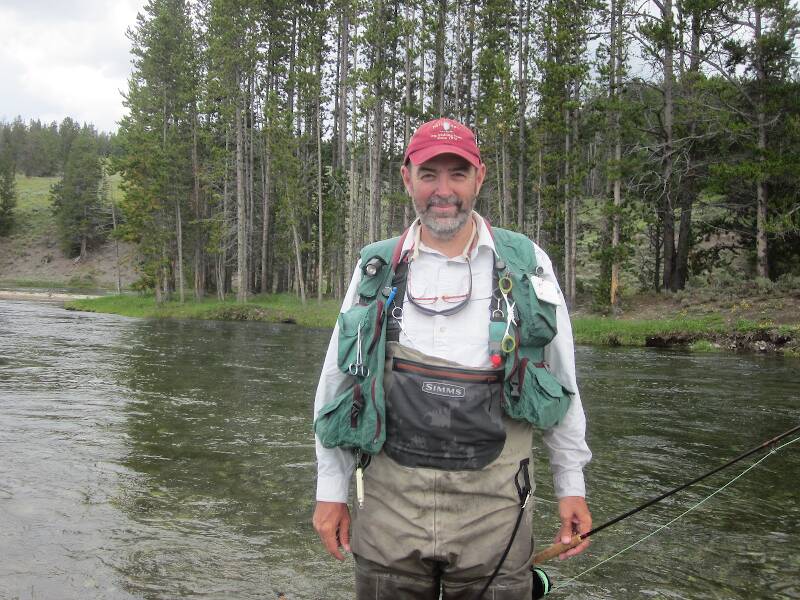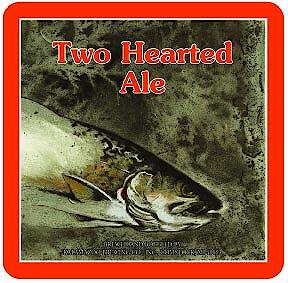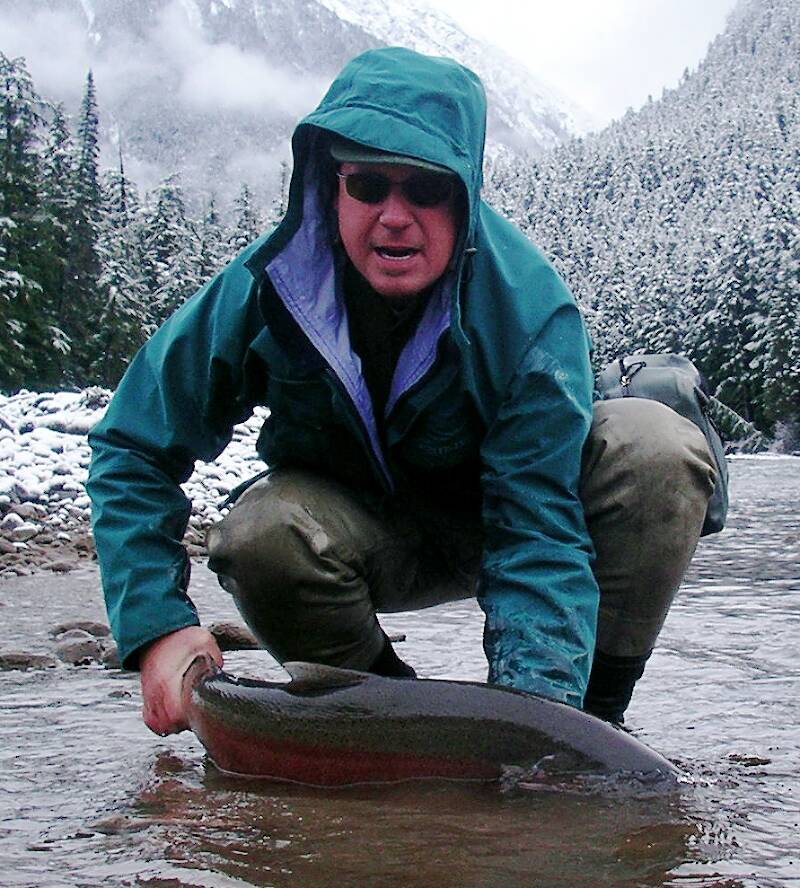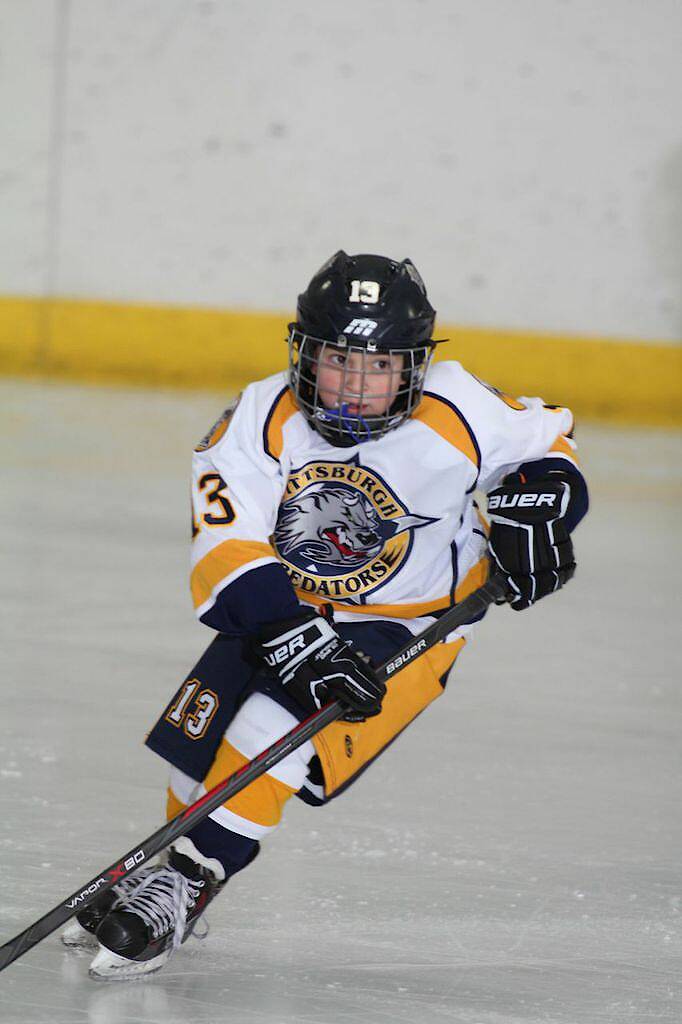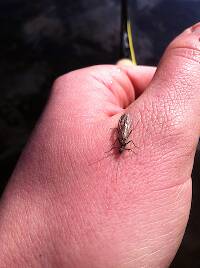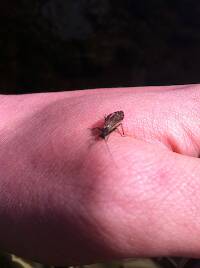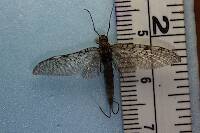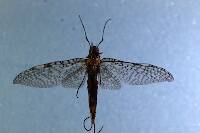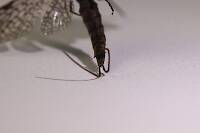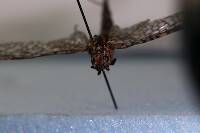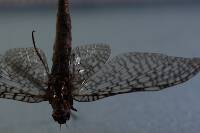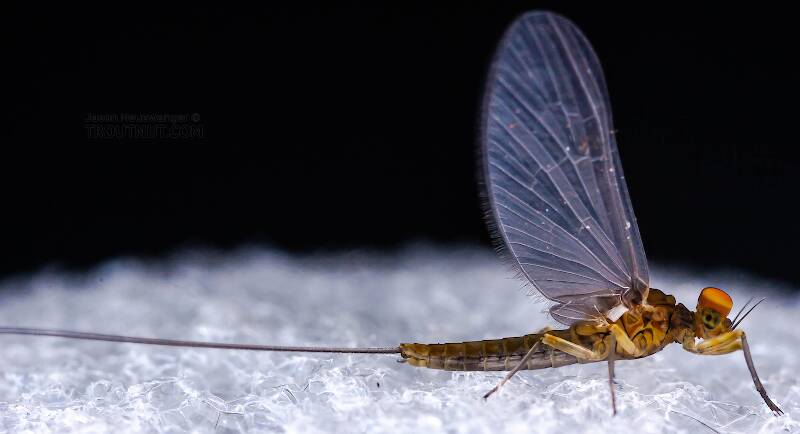
Blue-winged Olives
Baetis
Tiny Baetis mayflies are perhaps the most commonly encountered and imitated by anglers on all American trout streams due to their great abundance, widespread distribution, and trout-friendly emergence habits.
Featured on the forum
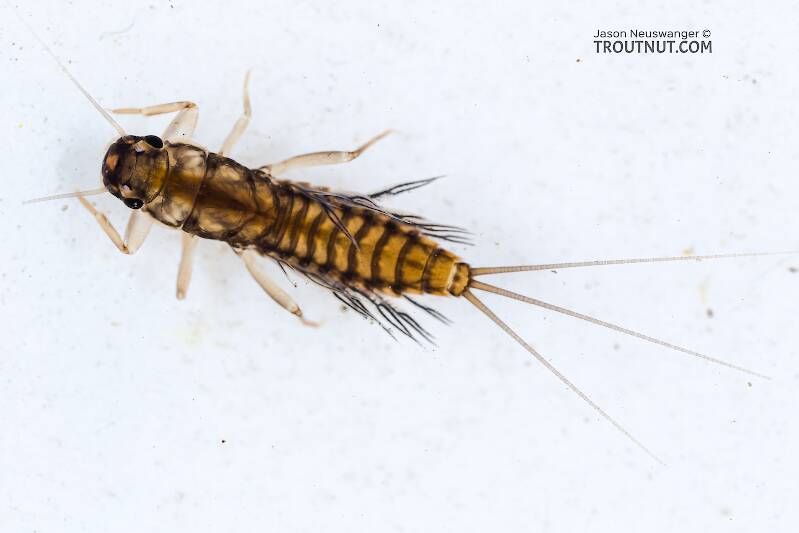
Some characteristics from the microscope images for the tentative species id: The postero-lateral projections are found only on segment 9, not segment 8. Based on the key in Jacobus et al. (2014), it appears to key to Neoleptophlebia adoptiva or Neoleptophlebia heteronea, same as this specimen with pretty different abdominal markings. However, distinguishing between those calls for comparing the lengths of the second and third segment of the labial palp, and this one (like the other one) only seems to have two segments. So I'm stuck on them both. It's likely that the fact that they're immature nymphs stymies identification in some important way.

Troutnut is a project started in 2003 by salmonid ecologist Jason "Troutnut" Neuswanger to help anglers and
fly tyers unabashedly embrace the entomological side of the sport. Learn more about Troutnut or
support the project for an enhanced experience here.
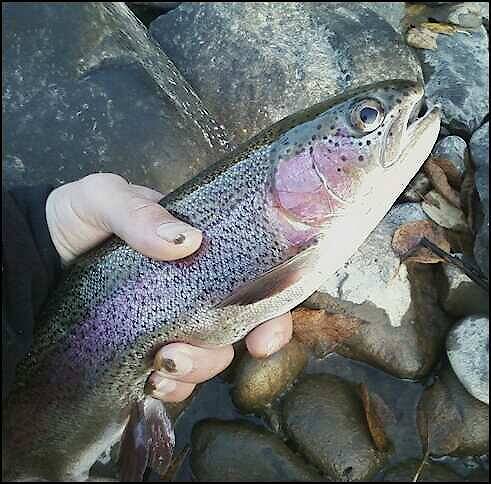
Oldredbarn on Nov 16, 2011November 16th, 2011, 6:12 pm EST
Cathy, I said, as we boarded a Greyhound in Pittsburgh
Small world, eh?! :) Speaking of small and our sub-topic here, fishing small flies...I just got a large hook order in for my winter tying from Blue Ribbon Flies. 18 boxes with 100 hooks in each. I guess I'll be busy! 11 boxes are 16's and smaller. My smallest is a size 24 and that's not as extreme as you Tony, but it's a 2x short...Does that count? :)
I bought a gallow's tool and if I can learn that paraloop technique you use on those flies of yours and get busy I should be ready for next spring...
I know this is off-topic Tony but I was doing some stonefly research the other day and I came across this critter in Capniidae...Hydroperla crosbyi (Needham)...I wonder if it can skate? :)
Spence
PS Tony you may not of been a hippie, but you are pretty "hip" in my book...:)
"Even when my best efforts fail it's a satisfying challenge, and that, after all, is the essence of fly fishing." -Chauncy Lively
"Envy not the man who lives beside the river, but the man the river flows through." Joseph T Heywood
"Envy not the man who lives beside the river, but the man the river flows through." Joseph T Heywood
Keystoner on Nov 16, 2011November 16th, 2011, 9:24 pm EST
"She said the man in the gabardine suit was a spy
I said "Be careful his bowtie is really a camera""
Got it on vinyl, and I'm only 30.
I said "Be careful his bowtie is really a camera""
Got it on vinyl, and I'm only 30.
"Out into the cool of the evening, strolls the Pretender. He knows that all his hopes and dreams, begin and end there." -JB
Entoman on Nov 16, 2011November 16th, 2011, 9:35 pm EST
I wonder if it can skate? :)
No, but it can probably hum bars of "Carry On" while riding the Marrakesh Express.
What is the paraloop method? Are you talking about loopwing paraduns or hackle stackers? What is the contraption for? Sorry for so many questions Spence, but I got lost on the way to Woodstock.:)
Regards,
Kurt
"It's not that I find fishing so important, it's just that I find all other endeavors of Man equally unimportant... And not nearly as much fun!" Robert Traver, Anatomy of a Fisherman
Oldredbarn on Nov 17, 2011November 17th, 2011, 5:12 am EST
What is the paraloop method? Are you talking about loopwing paraduns or hackle stackers? What is the contraption for?
I think, give or take, they are basically the same thing except one term, paraloop, is the term used in Europe. Hackle is wound up and back down thread or mono and then pulled over the top of the wingcase/thorax area and looks like Tony's pic there. The gallows tool just helps as a "third hand".
I am drawing a blank this morning, as to where I saw it, but a tyer, who's name is escaping me now as well, has created a "tool" with a rubber band and modified paper clip that hooks to the post of the gallows tool and holds the created wing material out of your way when you are wrapping the thorax with dubbing...
I might be better at remembering all this had I not been wrapping other things with different materials at Goose Lake Music Festival in 1970 at 16...;) Maybe my ears wouldn't have the dull ring in them that they do now if I had just avoided the music all together. :)
I may have seen the technique in the "Tyer's Benchside Guide" or their book on "Tying Emergers"...or even Tony...He has sent me some things about the method...I have yet to float a fly tied in this manner and I'm concerned with its floatability since hackle, and good quality hackle at that, functions to help float the fly.
Us dry-fly guys have been know to actually have had erotic dreams concerning the elusive "Blue-Dun" or "Honey-Dun" quality rooster neck hackle...:) I have a couple dun necks that my friend stops over to just look at from time-to-time...:) He actually said one time as he was gazing at it, "Spence. You don't tie with this. You frame it and hang it on the wall!"
I used to go in to Gates' Au Sable Lodges' fly shop in the morning when the coffee klatch was in there bending poor Rusty's ear with fishing bull-shit from the day before, and just stand alone back in the corner of the shop staring at the hackle on the wall...He called me at home a couple times to tell me, "Spence. The new Hebert stash has arrived. I have something so nice I don't even want to hang it on the wall. Do you want it?" What a salesman! :)
The gallows tool can be used, again as a third hand, when tying parachutes.
Aside: http://www.flytyingforum.com/index.php?showtopic=41281
The above step-by-step on tying a traditional hackle spinner was sent to me last March by a tyer in Norway, believe it or not, named John Terje Refsal...The next link is to a fly of his using the paraloop method.
http://www.danica.com/flytier/trefsahl/woven_danica_paraloop_emerger.htm
Spence
"Even when my best efforts fail it's a satisfying challenge, and that, after all, is the essence of fly fishing." -Chauncy Lively
"Envy not the man who lives beside the river, but the man the river flows through." Joseph T Heywood
"Envy not the man who lives beside the river, but the man the river flows through." Joseph T Heywood
Gutcutter on Nov 17, 2011November 17th, 2011, 7:33 am EST
The paraloop is Ian Moulter's European version of a hacklestacker.
Leeson shows the tool in Tying Emergers. I tie them "freehand" except for 20 and smaller. The gallows arm helps me a lot in the smaller sizes.
I have found that the hackle stackers actually float better and longer than traditional Catskill or thorax ties. I think that it must have something to do with the amount of feather fibers touching the meniscus.
The snooty browns out here usually haven't seen many of them, and I go to these when I'm getting refusals. They usually work better than other flies and I can fish the same fly for all stages of a trico hatch
Leeson shows the tool in Tying Emergers. I tie them "freehand" except for 20 and smaller. The gallows arm helps me a lot in the smaller sizes.
I have found that the hackle stackers actually float better and longer than traditional Catskill or thorax ties. I think that it must have something to do with the amount of feather fibers touching the meniscus.
The snooty browns out here usually haven't seen many of them, and I go to these when I'm getting refusals. They usually work better than other flies and I can fish the same fly for all stages of a trico hatch
All men who fish may in turn be divided into two parts: those who fish for trout and those who don't. Trout fishermen are a race apart: they are a dedicated crew- indolent, improvident, and quietly mad.
-Robert Traver, Trout Madness
-Robert Traver, Trout Madness
Oldredbarn on Nov 17, 2011November 17th, 2011, 8:21 am EST
The paraloop is Ian Moulter's European version
Thanks for jogging the old brain for me Tony...
"Freehand"! Just thinking about this clutz trying that makes my palms sweat...:) I'm going to try tying them though this winter and report back sometime next season. There has been many times when I was in the middle of tying a fly and had something in both hands just wishing I had another pair somehow!
Spence
More examples:
http://www.danica.com/flytier/dwiltshire/duck_fly_emerger.htm
http://www.danica.com/flytier/painsworth/paraloop_emerger.htm
"Even when my best efforts fail it's a satisfying challenge, and that, after all, is the essence of fly fishing." -Chauncy Lively
"Envy not the man who lives beside the river, but the man the river flows through." Joseph T Heywood
"Envy not the man who lives beside the river, but the man the river flows through." Joseph T Heywood
Entoman on Nov 17, 2011November 17th, 2011, 9:26 am EST
Thanks guys. Now I know what you are talking about.
The need for speed has always made me reluctant to use extra tools, i.e. half-hitch, whip finishers and such. I even keep polish-tipped scissors in the hand while tying to avoid the constant pickups and putdowns of bodkins and scissors.
Have you tried using mono for the post? It has big advantages:
Stiffer - making it easier to stick the ring finger in for holding while wrapping the hackle (exchanging the hackle between hands) . Also, it avoids the tendancy to twist up after wrapping the hackle if you need to leave it standing for another operation.
Slicker - As you stroke back the hackle with the off hand for pulling forward over the thorax, the slickness of the monoloop material allows for the hackle wraps to spread or compress (depending on how many wraps and size of thorax) for full and accurate coverage. Thread loops tend to keep the hackle wraps where they are put.
Regardless of fly size, I use the same sized loop (approx. two and a half inches). Every tier has a different loop size that will work best for them. Too short and you can't work with it, too long and it becomes difficult to hold it out stiffly with the ring finger as you wrap the hackle.
I have found this to be true as well, though I can't explain why. Your rational sounds reasonable to me. This fly is also very tough and easy to see (the latter trait becoming increasingly important to me :)). Boy, would I be happy if this fly worked all the time.
I agree, and wow is that a big advantage! Especially with baetids where having emergers, duns, and spinners on the water during a single fishing session is most common. The fish can be selective to stages and this fly handles them all better than any design I know. I usually tie mine with a little sprig of brown sparkle yarn (with the end fused) between the split tails to simulate the nymph shuck. If I'm positive they're on to clean duns or spinners, I'll just trim it out.
Tony - Your example is very well tied, my compliments... I'm fascinated by your reverse application. Because of stodgy prejudice, I have to admit I've never given reverse dries much of a chance because I just never liked the looks of them. Besides flotation advantages, there's another more important reason that came to mind while studying your example. Ever notice that mayflies usually proceed down stream head first? If the fish can get so picky about size, silhouette and color, why not orientation? I'm embarrassed to also admit that as a member of the "Fall River school" that supposedly popularized the downstream presentation more than thirty years ago, I've never thought to address this issue seriously before.
Regards,
Kurt
The need for speed has always made me reluctant to use extra tools, i.e. half-hitch, whip finishers and such. I even keep polish-tipped scissors in the hand while tying to avoid the constant pickups and putdowns of bodkins and scissors.
Have you tried using mono for the post? It has big advantages:
Stiffer - making it easier to stick the ring finger in for holding while wrapping the hackle (exchanging the hackle between hands) . Also, it avoids the tendancy to twist up after wrapping the hackle if you need to leave it standing for another operation.
Slicker - As you stroke back the hackle with the off hand for pulling forward over the thorax, the slickness of the monoloop material allows for the hackle wraps to spread or compress (depending on how many wraps and size of thorax) for full and accurate coverage. Thread loops tend to keep the hackle wraps where they are put.
Regardless of fly size, I use the same sized loop (approx. two and a half inches). Every tier has a different loop size that will work best for them. Too short and you can't work with it, too long and it becomes difficult to hold it out stiffly with the ring finger as you wrap the hackle.
I have found that the hackle stackers actually float better and longer than traditional Catskill or thorax ties. I think that it must have something to do with the amount of feather fibers touching the meniscus.
I have found this to be true as well, though I can't explain why. Your rational sounds reasonable to me. This fly is also very tough and easy to see (the latter trait becoming increasingly important to me :)). Boy, would I be happy if this fly worked all the time.
...and I can fish the same fly for all stages of a trico hatch
I agree, and wow is that a big advantage! Especially with baetids where having emergers, duns, and spinners on the water during a single fishing session is most common. The fish can be selective to stages and this fly handles them all better than any design I know. I usually tie mine with a little sprig of brown sparkle yarn (with the end fused) between the split tails to simulate the nymph shuck. If I'm positive they're on to clean duns or spinners, I'll just trim it out.
Tony - Your example is very well tied, my compliments... I'm fascinated by your reverse application. Because of stodgy prejudice, I have to admit I've never given reverse dries much of a chance because I just never liked the looks of them. Besides flotation advantages, there's another more important reason that came to mind while studying your example. Ever notice that mayflies usually proceed down stream head first? If the fish can get so picky about size, silhouette and color, why not orientation? I'm embarrassed to also admit that as a member of the "Fall River school" that supposedly popularized the downstream presentation more than thirty years ago, I've never thought to address this issue seriously before.
Regards,
Kurt
"It's not that I find fishing so important, it's just that I find all other endeavors of Man equally unimportant... And not nearly as much fun!" Robert Traver, Anatomy of a Fisherman
Sayfu
Posts: 560
Posts: 560
Sayfu on Nov 18, 2011November 18th, 2011, 4:19 am EST
Entoman. Slow down! All that need for speed creates aggressive personalities that won't take no for answers, or even a pause to think about making a no response. Happens to the computer programmers as well. They expect immediate gratification. :)
Entoman on Nov 18, 2011November 18th, 2011, 3:20 pm EST
I can't, the throttle's stuck! :)
"It's not that I find fishing so important, it's just that I find all other endeavors of Man equally unimportant... And not nearly as much fun!" Robert Traver, Anatomy of a Fisherman
Gutcutter on Nov 20, 2011November 20th, 2011, 11:15 am EST
Have you tried using mono for the post?
Kurt
yes, I have. I like using monofilament thread (Danville's Fine .006) on larger flies for those exact reasons. However, on flies size 22 and smaller, the monofilament post is a bit too thick and stiff in my opinion.
I use about 10 strands of polyyarn on the smaller sized flies.
I'm fascinated by your reverse application. Because of stodgy prejudice, I have to admit I've never given reverse dries much of a chance because I just never liked the looks of them...
Ever notice that mayflies usually proceed down stream head first? If the fish can get so picky about size, silhouette and color, why not orientation?
I began this several years ago, when my "Al's Trico" patterns started to become ignored and just another fly on our heavily fished limestoners and spring creeks. I tried to tie it "standard", but it was difficult to get the stacked hackle to turn over and leave enough at the hook eye to get a nicely proportioned fly. Probably didn't like it more on my end than what the fish would like. As a matter of fact, I have used some of those early versions with success, but I have more confidence (and thus more success) with the reverse hackle stacker.
I tie most of my larger patterns with the hackle up front, but there are a few large and well seasoned browns on Nelson's that refused everything except a #18 reversed hacklestacker spinner during a massive PMD spinner fall. I only had a few of those flies and I wasn't sharing and my buddies were pissed...
I tied a dozen that night, but the spinnerfall was never that heavy again during our trip, and they ate conventional spinners well.
All men who fish may in turn be divided into two parts: those who fish for trout and those who don't. Trout fishermen are a race apart: they are a dedicated crew- indolent, improvident, and quietly mad.
-Robert Traver, Trout Madness
-Robert Traver, Trout Madness
Entoman on Nov 21, 2011November 21st, 2011, 7:39 am EST
Hi Tony -
That all makes sense. I'm gonna tie up a bunch and give them a go next year. Hearing that Mr. Nelson Brown approved of them is all the motivation I need.:)
Yeah, I use the same stuff for tying some streamer patterns that call for it because it's nice to have it spooled for use with a bobbin. For stackers though, I just use replaced spools of tippet. The fluorocarbon is much stiffer and easier to work with and you never have to worry about it rotting. For tiny flies I use old spools of 6x to 8X. In 8x, it's half as fine and almost as stiff as the mono thread. Also, if you use Danville's spiderweb for tying thread, bulk isn't an issue even for stacking at the head, at least for TMC 100's in size 20 with the smaller tippet material. Western Trico's seem to run larger so I rarely find need to go smaller except for baetid's where I'll use the TMC 500u down to 22 (24 eq.shank). I've never tried to tie hackle stackers on these tiny short shank hooks, so maybe you're right that it isn't practical..
Regards,
Kurt
That all makes sense. I'm gonna tie up a bunch and give them a go next year. Hearing that Mr. Nelson Brown approved of them is all the motivation I need.:)
I like using monofilament thread (Danville's Fine .006)
Yeah, I use the same stuff for tying some streamer patterns that call for it because it's nice to have it spooled for use with a bobbin. For stackers though, I just use replaced spools of tippet. The fluorocarbon is much stiffer and easier to work with and you never have to worry about it rotting. For tiny flies I use old spools of 6x to 8X. In 8x, it's half as fine and almost as stiff as the mono thread. Also, if you use Danville's spiderweb for tying thread, bulk isn't an issue even for stacking at the head, at least for TMC 100's in size 20 with the smaller tippet material. Western Trico's seem to run larger so I rarely find need to go smaller except for baetid's where I'll use the TMC 500u down to 22 (24 eq.shank). I've never tried to tie hackle stackers on these tiny short shank hooks, so maybe you're right that it isn't practical..
Regards,
Kurt
"It's not that I find fishing so important, it's just that I find all other endeavors of Man equally unimportant... And not nearly as much fun!" Robert Traver, Anatomy of a Fisherman
Gutcutter on Nov 26, 2011November 26th, 2011, 9:39 am EST
I just use replaced spools of tippet. The fluorocarbon is much stiffer and easier to work with and you never have to worry about it rotting. For tiny flies I use old spools of 6x to 8X. In 8x, it's half as fine and almost as stiff as the mono thread.
Kurt
I will try that. I have some spools of 7x and 8x FrogHair Fluoro that really stinks as tippet (when compared to other brands) and will try to use it for that purpose.
The smallest that I tie hacklestackers is 24 (2488 hook) and the size of the thorax on that fly is too small for me to use the limp .006" when tying the hackle at the eye. the poly yarn works well at the bend, although the limpness is a pain in the ass to get a really thick hackle brush to stack.
All men who fish may in turn be divided into two parts: those who fish for trout and those who don't. Trout fishermen are a race apart: they are a dedicated crew- indolent, improvident, and quietly mad.
-Robert Traver, Trout Madness
-Robert Traver, Trout Madness
Entoman on Nov 26, 2011November 26th, 2011, 12:39 pm EST
Tony -
Yes, I can imagine... In thinking about it, you should be able to use fine mono on the reverse numbers (at least the thicker tricos). If you trim the butts angled with one a little longer than the other, it could help with the taper? Another thing, I don't know if the mono would make the whole thorax more prone to slip around the bend.
A size 24 2488 hook isn't much shank to work with though. For you guys perhaps unaware of what Tony is referencing, think the space allocated for the head on a normal fly.:) And a curved shank, no less! With that kind of skill, you should be able to splice capillaries together on the operating table. I can see you at the tying bench in my mind, tying these tiny things with an assistant at your right hand. "Bobbin!.... Bodkin!.... Brow wipe, please... Scissors!.... No, the other pair!.... Ok, tie it off...." :):)
Regards,
Kurt
although the limpness is a pain in the ass to get a really thick hackle brush to stack.
Yes, I can imagine... In thinking about it, you should be able to use fine mono on the reverse numbers (at least the thicker tricos). If you trim the butts angled with one a little longer than the other, it could help with the taper? Another thing, I don't know if the mono would make the whole thorax more prone to slip around the bend.
A size 24 2488 hook isn't much shank to work with though. For you guys perhaps unaware of what Tony is referencing, think the space allocated for the head on a normal fly.:) And a curved shank, no less! With that kind of skill, you should be able to splice capillaries together on the operating table. I can see you at the tying bench in my mind, tying these tiny things with an assistant at your right hand. "Bobbin!.... Bodkin!.... Brow wipe, please... Scissors!.... No, the other pair!.... Ok, tie it off...." :):)
Regards,
Kurt
"It's not that I find fishing so important, it's just that I find all other endeavors of Man equally unimportant... And not nearly as much fun!" Robert Traver, Anatomy of a Fisherman
Quick Reply
Related Discussions
Topic
Replies
Last Reply
1
Jan 28, 2018
by Taxon
by Taxon


